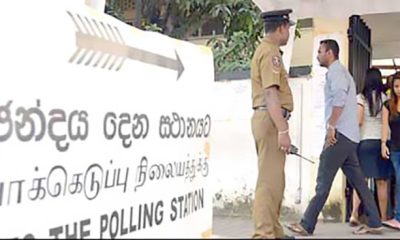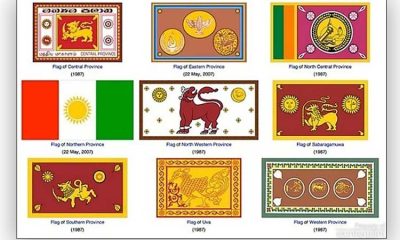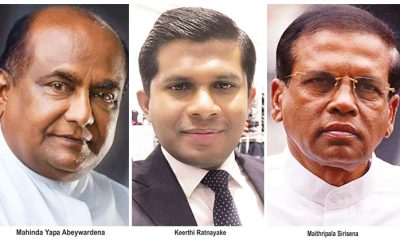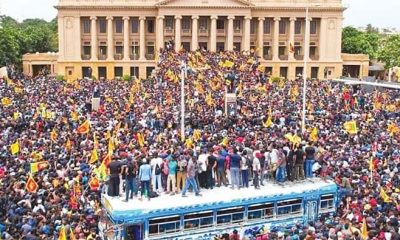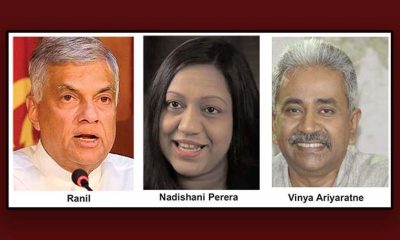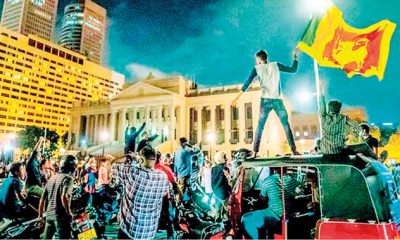Features
Legal implications of Aragalaya protests
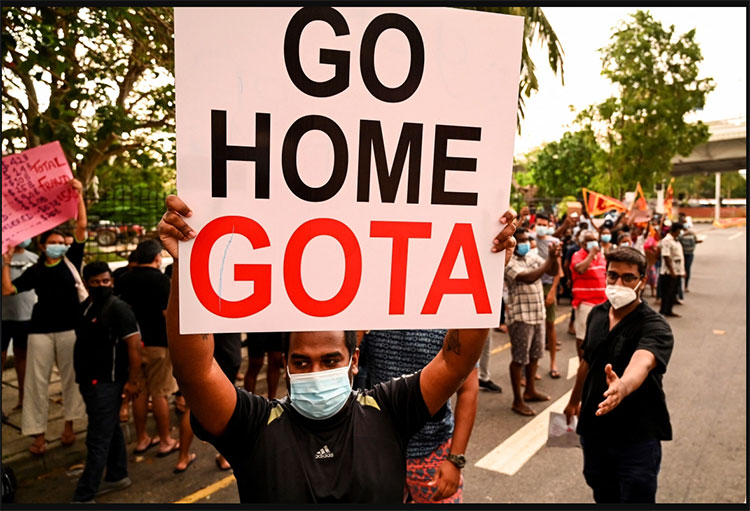
By Dharshan Weerasekera
The ‘Aragalaya protests,’ by which I mean the protests that started in mid-March and culminated in the storming of the President’s House, and the Presidential Secretariat on 09 July, leading to the subsequent resignation of the President, have been praised by many commentators as a triumph of democracy, and a resounding affirmation of the rights of the people. However, there is another perspective that one must consider at least for the sake of argument, namely, that the events in question demonstrate the supplanting of the rule of law, in our country by the rule of the mob.
There is very little discussion of this second perspective in local academic journals and newspapers, and it is in the public interest to start one. I argue that the protests are illegal because they contravene the letter and spirit of the Constitution, embodied in Articles 3 and 4 thereof, which I will explain more fully. I argue further that some fans of the protests are using a version of the ‘social contract theory,’ associated chiefly with the seminal thinkers Thomas Hobbes, John Locke and Rousseau, to defend them.
It is vital that both the above matters be brought to the attention of the public because there is a danger that if they go unchallenged, they might creep into formal academic discourse and perhaps even into judicial rulings in the future, with devastating consequences. In this article, I shall briefly explain: a) why the ‘Aragalaya’ protests are illegal and, b) why the application of social contract theory to the protests is fallacious.
The constitutional argument
Arguably, the most important clauses in the Sri Lankan Constitution are Articles 3 and 4. Article 3 states: “In the Republic of Sri Lanka sovereignty is in the People and inalienable.” So, it identifies the ultimate basis of the Constitution’s authority and by extension its validity. Meanwhile, Article 4 enumerates the specific ways in which the people are to exercise their sovereignty, for instance, legislative power through a Parliament comprising of elected representatives, executive power through a President elected by the people, the franchise directly by the people and so on.
The necessary implication of an enumeration such as the above is that if the people wish to exercise their sovereignty, including changing the government, they must do so through the specific means spelled out in Article 4. The Constitution does not recognize any other ways through which the people may exercise their sovereignty, for instance, through popular uprisings and other such means. Nor does it reserve to the people the right to invent such means. To suppose otherwise would be to hold that the Constitution, the ‘Supreme Law of the Land,’ is supreme only when it is convenient for people to consider it so.
The above argument is strengthened when one considers what might be the possible obligations of the citizens towards the state. It is well-known that “rights always go hand in hand with responsibilities.” Sri Lanka is by and large a welfare state and almost the entire gamut of essential services is heavily if not entirely subsidized by the state. We have free healthcare, free education, farm subsidies and so on. The state is also the largest employer. Without a doubt, the persons who participated in the protests, if they were citizens of Sri Lanka, would have benefited to some degree or other from these services in the course of their lives.
In these circumstances, the question is whether at a time as the state was in financial difficulties at least partly as a result of factors beyond its control such as the costs of facing a pandemic and also the Easter Sunday terrorist attacks that crippled tourism, one of the pillars of the economy, it would have been more reasonable for the protesters to exercise some patience, instead of taking to the streets immediately, and calling for the ouster of the government?
To digress a moment, there is an extraordinary passage in Plato’s ‘Crito’ that speaks to the above question and it is worthwhile quoting it at length. The background to the passage is as follows: The Athenian Assembly had sentenced Socrates to death for allegedly “corrupting the youth” with his philosophizing. He was in jail awaiting execution. A group of his friends, led by Crito, arrange an escape for him and Crito visits the prison to tell him about the plan.
But Socrates refuses the offer. The essence of his argument is that as an Athenian citizen he had benefitted from the state throughout his life. Now, when the state had punished him, it would be wrong for him to turn his back on the state, even though the punishment might be unjust. He says,
“Imagine that I am about to play truant, and the laws and the government come and interrogate me: “Tell us, Socrates:, they say, “what are you about?” Are you not going by an act of yours to overturn us—the laws, and the whole state, as far as in you lies? Do you imagine that a state can subsist and not be overthrown, in which the decisions of law have no power, but are set aside and trampled upon by individuals?” He goes on…
“Then, the laws will say, “Consider, Socrates, if we are speaking truly that in your present attempt you are going to do us an injury. For, having brought you into the world, and nurtured and educated you, and given you and every other citizen a share in every good we had to give, we further proclaim to any Athenian by the liberty which we allow him, that if he does not like us when he has become of age and has seen the ways of the city, and made our acquaintance, he may go where he pleases and take his goods with him. None of us laws will forbid him or interfere with him. Anyone who does not like us and the city, and who wants to emigrate to a colony or to any other city, may go where he likes, retaining his property.” (‘Crito’, Complete Dialogues of Plato, (trans. Benjamin Jowett) London, 1952, p. 217)
At the time of the protests, all of the means provided by the Constitution for changing the government were available to the citizens of this country. Now, a critic might say that it would have taken too long to exercise those means, for instance, if people were to wait for two years, until the next elections, the country would have been ruined. But then, the means to change the times for elections were also available. To my knowledge, the government had made no attempt to suspend the Constitution or any part thereof.
Also, Socrates’ point, although made in a different context, is highly relevant here. If any citizen was dissatisfied with the prevailing situation, they had the option of leaving. In these circumstances, was it lawful for the protesters to storm the President’s House and Secretariat and forcibly evict the President, from those premises, and, shortly afterwards, the country, leading to his subsequent resignation? In my opinion, the conclusion is inescapable that the said act is illegal.
Social Contract Theory as a defence for the protests
A perusal of commentary on the protests shows that many writers rely on a version of the “social contract theory” to defend them. In my view, their stance is untenable because of the following reasons. “Social contract theory,” is chiefly associated with Thomas Hobbes (1588-1679), John Locke (1632-1704) and Jean Jacques Rousseau (1712-1778). As far as I am aware, the idea behind the theory is that at the very inception of a state, the people enter into a contract with their rulers whereby the former surrender a portion of their sovereignty to the rulers in exchange for the rulers ensuring the security and welfare of the people.
If the rulers fail to fulfill their end of the deal, the people would be justified in ousting them. Locke famously says in “An Essay Concerning Civil Government”: “Whenever law ends, tyranny begins. If the law be transgressed to another’s harm; and whosoever in authority exceeds the power given him by the law, and makes use of the force he has under his command to compass that upon the subject which the law allows not, ceases in that to be a magistrate, and acting without authority may be opposed, as any other man who by force invades the rights of another.” (‘An Essay Concerning Civil Government’, p. 71)
As mentioned earlier, some commentators try to defend the protests by resort to a version of the above argument. According to them, the former President exceeded his authority or in some other way reneged on his obligations to the people and hence the people had a right to oust him. However, leaving aside the question whether such a dereliction of duty in fact happened, Locke’s argument can be distinguished from the Sri Lankan situation very clearly.
Locke, Hobbes and Rousseau were responding to the fundamental transformations that were taking in the political systems of their respective countries. In the case of Hobbes and Locke, it was to the transition from a monarchy to a constitutional monarchy that was taking place in England over the course of the 17th century and in the case of Rousseau it was to the transition from a monarchy to a Republic symbolized by the French Revolution.
Each thinker, in his own way, was trying to find a way to legitimize the emerging political order. In order to do this, they introduced the notion that the ultimate authority in the state comes from the people, as opposed to the monarch who at the time was understood as deriving his authority from God. In sum, social contract theory applies to situations where new political systems are being formed, not to convulsions in such systems once theyare formed. For instance, if people can topple the government at will, what is the point of having elections?
Democracy is understood as rule by the consent of the people. If one accepts that the way in which this consent is expressed is though elections, then changing governments, other than through constitutionally prescribed methods, createsthe potential for perpetual instability in the state and thereby negates the very purpose for which the social contract is purportedly formed, namely, ensuring the security and well-being of the people.
Conclusion
Sri Lankans must decide whether they want to live in a country where the rule of law prevails or, ultimately, the rule of the mob. If the former, they need to reflect deeply about what happened in the course of the protests and devise constitutional means to prevent such things from repeating.
(The writer is an Attorney-at-Law)
Features
The heart-friendly health minister

by Dr Gotabhya Ranasinghe
Senior Consultant Cardiologist
National Hospital Sri Lanka
When we sought a meeting with Hon Dr. Ramesh Pathirana, Minister of Health, he graciously cleared his busy schedule to accommodate us. Renowned for his attentive listening and deep understanding, Minister Pathirana is dedicated to advancing the health sector. His openness and transparency exemplify the qualities of an exemplary politician and minister.
Dr. Palitha Mahipala, the current Health Secretary, demonstrates both commendable enthusiasm and unwavering support. This combination of attributes makes him a highly compatible colleague for the esteemed Minister of Health.
Our discussion centered on a project that has been in the works for the past 30 years, one that no other minister had managed to advance.
Minister Pathirana, however, recognized the project’s significance and its potential to revolutionize care for heart patients.
The project involves the construction of a state-of-the-art facility at the premises of the National Hospital Colombo. The project’s location within the premises of the National Hospital underscores its importance and relevance to the healthcare infrastructure of the nation.
This facility will include a cardiology building and a tertiary care center, equipped with the latest technology to handle and treat all types of heart-related conditions and surgeries.
Securing funding was a major milestone for this initiative. Minister Pathirana successfully obtained approval for a $40 billion loan from the Asian Development Bank. With the funding in place, the foundation stone is scheduled to be laid in September this year, and construction will begin in January 2025.
This project guarantees a consistent and uninterrupted supply of stents and related medications for heart patients. As a result, patients will have timely access to essential medical supplies during their treatment and recovery. By securing these critical resources, the project aims to enhance patient outcomes, minimize treatment delays, and maintain the highest standards of cardiac care.
Upon its fruition, this monumental building will serve as a beacon of hope and healing, symbolizing the unwavering dedication to improving patient outcomes and fostering a healthier society.We anticipate a future marked by significant progress and positive outcomes in Sri Lanka’s cardiovascular treatment landscape within the foreseeable timeframe.
Features
A LOVING TRIBUTE TO JESUIT FR. ALOYSIUS PIERIS ON HIS 90th BIRTHDAY

by Fr. Emmanuel Fernando, OMI
Jesuit Fr. Aloysius Pieris (affectionately called Fr. Aloy) celebrated his 90th birthday on April 9, 2024 and I, as the editor of our Oblate Journal, THE MISSIONARY OBLATE had gone to press by that time. Immediately I decided to publish an article, appreciating the untiring selfless services he continues to offer for inter-Faith dialogue, the renewal of the Catholic Church, his concern for the poor and the suffering Sri Lankan masses and to me, the present writer.
It was in 1988, when I was appointed Director of the Oblate Scholastics at Ampitiya by the then Oblate Provincial Fr. Anselm Silva, that I came to know Fr. Aloy more closely. Knowing well his expertise in matters spiritual, theological, Indological and pastoral, and with the collaborative spirit of my companion-formators, our Oblate Scholastics were sent to Tulana, the Research and Encounter Centre, Kelaniya, of which he is the Founder-Director, for ‘exposure-programmes’ on matters spiritual, biblical, theological and pastoral. Some of these dimensions according to my view and that of my companion-formators, were not available at the National Seminary, Ampitiya.
Ever since that time, our Oblate formators/ accompaniers at the Oblate Scholasticate, Ampitiya , have continued to send our Oblate Scholastics to Tulana Centre for deepening their insights and convictions regarding matters needed to serve the people in today’s context. Fr. Aloy also had tried very enthusiastically with the Oblate team headed by Frs. Oswald Firth and Clement Waidyasekara to begin a Theologate, directed by the Religious Congregations in Sri Lanka, for the contextual formation/ accompaniment of their members. It should very well be a desired goal of the Leaders / Provincials of the Religious Congregations.
Besides being a formator/accompanier at the Oblate Scholasticate, I was entrusted also with the task of editing and publishing our Oblate journal, ‘The Missionary Oblate’. To maintain the quality of the journal I continue to depend on Fr. Aloy for his thought-provoking and stimulating articles on Biblical Spirituality, Biblical Theology and Ecclesiology. I am very grateful to him for his generous assistance. Of late, his writings on renewal of the Church, initiated by Pope St. John XX111 and continued by Pope Francis through the Synodal path, published in our Oblate journal, enable our readers to focus their attention also on the needed renewal in the Catholic Church in Sri Lanka. Fr. Aloy appreciated very much the Synodal path adopted by the Jesuit Pope Francis for the renewal of the Church, rooted very much on prayerful discernment. In my Religious and presbyteral life, Fr.Aloy continues to be my spiritual animator / guide and ongoing formator / acccompanier.
Fr. Aloysius Pieris, BA Hons (Lond), LPh (SHC, India), STL (PFT, Naples), PhD (SLU/VC), ThD (Tilburg), D.Ltt (KU), has been one of the eminent Asian theologians well recognized internationally and one who has lectured and held visiting chairs in many universities both in the West and in the East. Many members of Religious Congregations from Asian countries have benefited from his lectures and guidance in the East Asian Pastoral Institute (EAPI) in Manila, Philippines. He had been a Theologian consulted by the Federation of Asian Bishops’ Conferences for many years. During his professorship at the Gregorian University in Rome, he was called to be a member of a special group of advisers on other religions consulted by Pope Paul VI.
Fr. Aloy is the author of more than 30 books and well over 500 Research Papers. Some of his books and articles have been translated and published in several countries. Among those books, one can find the following: 1) The Genesis of an Asian Theology of Liberation (An Autobiographical Excursus on the Art of Theologising in Asia, 2) An Asian Theology of Liberation, 3) Providential Timeliness of Vatican 11 (a long-overdue halt to a scandalous millennium, 4) Give Vatican 11 a chance, 5) Leadership in the Church, 6) Relishing our faith in working for justice (Themes for study and discussion), 7) A Message meant mainly, not exclusively for Jesuits (Background information necessary for helping Francis renew the Church), 8) Lent in Lanka (Reflections and Resolutions, 9) Love meets wisdom (A Christian Experience of Buddhism, 10) Fire and Water 11) God’s Reign for God’s poor, 12) Our Unhiddden Agenda (How we Jesuits work, pray and form our men). He is also the Editor of two journals, Vagdevi, Journal of Religious Reflection and Dialogue, New Series.
Fr. Aloy has a BA in Pali and Sanskrit from the University of London and a Ph.D in Buddhist Philosophy from the University of Sri Lankan, Vidyodaya Campus. On Nov. 23, 2019, he was awarded the prestigious honorary Doctorate of Literature (D.Litt) by the Chancellor of the University of Kelaniya, the Most Venerable Welamitiyawe Dharmakirthi Sri Kusala Dhamma Thera.
Fr. Aloy continues to be a promoter of Gospel values and virtues. Justice as a constitutive dimension of love and social concern for the downtrodden masses are very much noted in his life and work. He had very much appreciated the commitment of the late Fr. Joseph (Joe) Fernando, the National Director of the Social and Economic Centre (SEDEC) for the poor.
In Sri Lanka, a few religious Congregations – the Good Shepherd Sisters, the Christian Brothers, the Marist Brothers and the Oblates – have invited him to animate their members especially during their Provincial Congresses, Chapters and International Conferences. The mainline Christian Churches also have sought his advice and followed his seminars. I, for one, regret very much, that the Sri Lankan authorities of the Catholic Church –today’s Hierarchy—- have not sought Fr.
Aloy’s expertise for the renewal of the Catholic Church in Sri Lanka and thus have not benefited from the immense store of wisdom and insight that he can offer to our local Church while the Sri Lankan bishops who governed the Catholic church in the immediate aftermath of the Second Vatican Council (Edmund Fernando OMI, Anthony de Saram, Leo Nanayakkara OSB, Frank Marcus Fernando, Paul Perera,) visited him and consulted him on many matters. Among the Tamil Bishops, Bishop Rayappu Joseph was keeping close contact with him and Bishop J. Deogupillai hosted him and his team visiting him after the horrible Black July massacre of Tamils.
Features
A fairy tale, success or debacle

Sri Lanka-Singapore Free Trade Agreement
By Gomi Senadhira
senadhiragomi@gmail.com
“You might tell fairy tales, but the progress of a country cannot be achieved through such narratives. A country cannot be developed by making false promises. The country moved backward because of the electoral promises made by political parties throughout time. We have witnessed that the ultimate result of this is the country becoming bankrupt. Unfortunately, many segments of the population have not come to realize this yet.” – President Ranil Wickremesinghe, 2024 Budget speech
Any Sri Lankan would agree with the above words of President Wickremesinghe on the false promises our politicians and officials make and the fairy tales they narrate which bankrupted this country. So, to understand this, let’s look at one such fairy tale with lots of false promises; Ranil Wickremesinghe’s greatest achievement in the area of international trade and investment promotion during the Yahapalana period, Sri Lanka-Singapore Free Trade Agreement (SLSFTA).
It is appropriate and timely to do it now as Finance Minister Wickremesinghe has just presented to parliament a bill on the National Policy on Economic Transformation which includes the establishment of an Office for International Trade and the Sri Lanka Institute of Economics and International Trade.
Was SLSFTA a “Cleverly negotiated Free Trade Agreement” as stated by the (former) Minister of Development Strategies and International Trade Malik Samarawickrama during the Parliamentary Debate on the SLSFTA in July 2018, or a colossal blunder covered up with lies, false promises, and fairy tales? After SLSFTA was signed there were a number of fairy tales published on this agreement by the Ministry of Development Strategies and International, Institute of Policy Studies, and others.
However, for this article, I would like to limit my comments to the speech by Minister Samarawickrama during the Parliamentary Debate, and the two most important areas in the agreement which were covered up with lies, fairy tales, and false promises, namely: revenue loss for Sri Lanka and Investment from Singapore. On the other important area, “Waste products dumping” I do not want to comment here as I have written extensively on the issue.
1. The revenue loss
During the Parliamentary Debate in July 2018, Minister Samarawickrama stated “…. let me reiterate that this FTA with Singapore has been very cleverly negotiated by us…. The liberalisation programme under this FTA has been carefully designed to have the least impact on domestic industry and revenue collection. We have included all revenue sensitive items in the negative list of items which will not be subject to removal of tariff. Therefore, 97.8% revenue from Customs duty is protected. Our tariff liberalisation will take place over a period of 12-15 years! In fact, the revenue earned through tariffs on goods imported from Singapore last year was Rs. 35 billion.
The revenue loss for over the next 15 years due to the FTA is only Rs. 733 million– which when annualised, on average, is just Rs. 51 million. That is just 0.14% per year! So anyone who claims the Singapore FTA causes revenue loss to the Government cannot do basic arithmetic! Mr. Speaker, in conclusion, I call on my fellow members of this House – don’t mislead the public with baseless criticism that is not grounded in facts. Don’t look at petty politics and use these issues for your own political survival.”
I was surprised to read the minister’s speech because an article published in January 2018 in “The Straits Times“, based on information released by the Singaporean Negotiators stated, “…. With the FTA, tariff savings for Singapore exports are estimated to hit $10 million annually“.
As the annual tariff savings (that is the revenue loss for Sri Lanka) calculated by the Singaporean Negotiators, Singaporean $ 10 million (Sri Lankan rupees 1,200 million in 2018) was way above the rupees’ 733 million revenue loss for 15 years estimated by the Sri Lankan negotiators, it was clear to any observer that one of the parties to the agreement had not done the basic arithmetic!
Six years later, according to a report published by “The Morning” newspaper, speaking at the Committee on Public Finance (COPF) on 7th May 2024, Mr Samarawickrama’s chief trade negotiator K.J. Weerasinghehad had admitted “…. that forecasted revenue loss for the Government of Sri Lanka through the Singapore FTA is Rs. 450 million in 2023 and Rs. 1.3 billion in 2024.”
If these numbers are correct, as tariff liberalisation under the SLSFTA has just started, we will pass Rs 2 billion very soon. Then, the question is how Sri Lanka’s trade negotiators made such a colossal blunder. Didn’t they do their basic arithmetic? If they didn’t know how to do basic arithmetic they should have at least done their basic readings. For example, the headline of the article published in The Straits Times in January 2018 was “Singapore, Sri Lanka sign FTA, annual savings of $10m expected”.
Anyway, as Sri Lanka’s chief negotiator reiterated at the COPF meeting that “…. since 99% of the tariffs in Singapore have zero rates of duty, Sri Lanka has agreed on 80% tariff liberalisation over a period of 15 years while expecting Singapore investments to address the imbalance in trade,” let’s turn towards investment.
Investment from Singapore
In July 2018, speaking during the Parliamentary Debate on the FTA this is what Minister Malik Samarawickrama stated on investment from Singapore, “Already, thanks to this FTA, in just the past two-and-a-half months since the agreement came into effect we have received a proposal from Singapore for investment amounting to $ 14.8 billion in an oil refinery for export of petroleum products. In addition, we have proposals for a steel manufacturing plant for exports ($ 1 billion investment), flour milling plant ($ 50 million), sugar refinery ($ 200 million). This adds up to more than $ 16.05 billion in the pipeline on these projects alone.
And all of these projects will create thousands of more jobs for our people. In principle approval has already been granted by the BOI and the investors are awaiting the release of land the environmental approvals to commence the project.
I request the Opposition and those with vested interests to change their narrow-minded thinking and join us to develop our country. We must always look at what is best for the whole community, not just the few who may oppose. We owe it to our people to courageously take decisions that will change their lives for the better.”
According to the media report I quoted earlier, speaking at the Committee on Public Finance (COPF) Chief Negotiator Weerasinghe has admitted that Sri Lanka was not happy with overall Singapore investments that have come in the past few years in return for the trade liberalisation under the Singapore-Sri Lanka Free Trade Agreement. He has added that between 2021 and 2023 the total investment from Singapore had been around $162 million!
What happened to those projects worth $16 billion negotiated, thanks to the SLSFTA, in just the two-and-a-half months after the agreement came into effect and approved by the BOI? I do not know about the steel manufacturing plant for exports ($ 1 billion investment), flour milling plant ($ 50 million) and sugar refinery ($ 200 million).
However, story of the multibillion-dollar investment in the Petroleum Refinery unfolded in a manner that would qualify it as the best fairy tale with false promises presented by our politicians and the officials, prior to 2019 elections.
Though many Sri Lankans got to know, through the media which repeatedly highlighted a plethora of issues surrounding the project and the questionable credentials of the Singaporean investor, the construction work on the Mirrijiwela Oil Refinery along with the cement factory began on the24th of March 2019 with a bang and Minister Ranil Wickremesinghe and his ministers along with the foreign and local dignitaries laid the foundation stones.
That was few months before the 2019 Presidential elections. Inaugurating the construction work Prime Minister Ranil Wickremesinghe said the projects will create thousands of job opportunities in the area and surrounding districts.
The oil refinery, which was to be built over 200 acres of land, with the capacity to refine 200,000 barrels of crude oil per day, was to generate US$7 billion of exports and create 1,500 direct and 3,000 indirect jobs. The construction of the refinery was to be completed in 44 months. Four years later, in August 2023 the Cabinet of Ministers approved the proposal presented by President Ranil Wickremesinghe to cancel the agreement with the investors of the refinery as the project has not been implemented! Can they explain to the country how much money was wasted to produce that fairy tale?
It is obvious that the President, ministers, and officials had made huge blunders and had deliberately misled the public and the parliament on the revenue loss and potential investment from SLSFTA with fairy tales and false promises.
As the president himself said, a country cannot be developed by making false promises or with fairy tales and these false promises and fairy tales had bankrupted the country. “Unfortunately, many segments of the population have not come to realize this yet”.
(The writer, a specialist and an activist on trade and development issues . )


